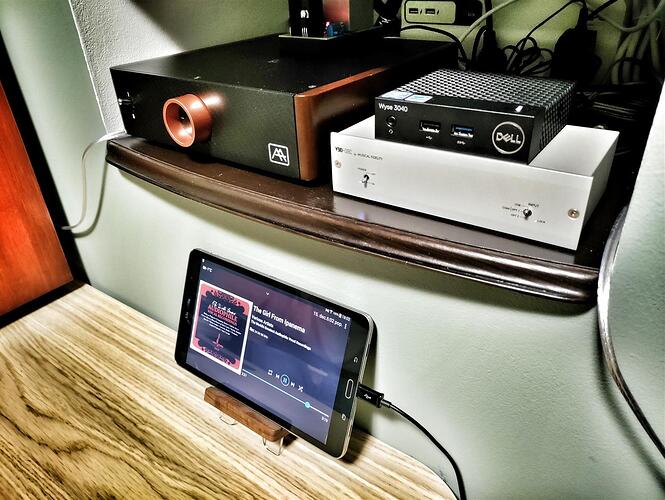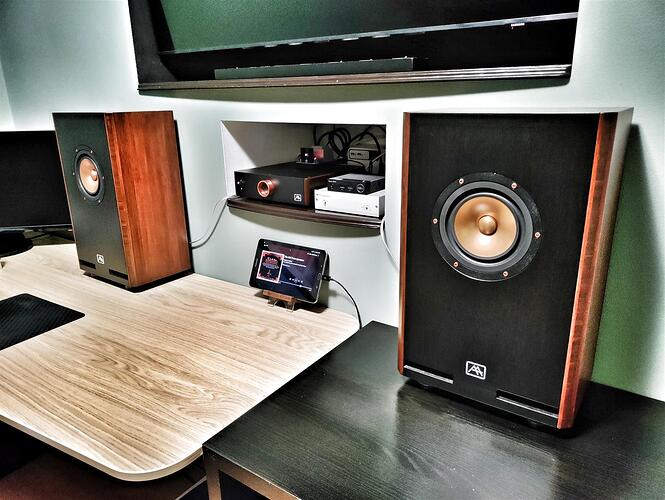Giovanni,
thanks for a very nice review and yes, pity there aren’t going to be more units. My sources sort of “dried out” for reasonable prices. Some ask 250€ for a batch of 6, per PIECE!
Gé
So, I also thought I would add my thoughts about this device. This response will get a bit long and technical so here is an Executive Summary first:
As a Volumio Appliance this is a great solution for most people. The sound is good (maybe not great but not bad) from the built in headphone jack - I will probably get an USB DAC eventually and the limitations of this device (memory + storage) are not required for Volumio and the pre-installed build that @gkkpch provides is perfect. But I did try to do more with this device.
So I am a big fan of low power SBC devices - I have 3 ODroid’s and 2 Raspberry PI’s already in my home network running various things - like homebridge, plex, nextcloud and of course for Volumio.
Specifically for my collection music (hosted on a NAS), I have 2 Volumio’s (RPI’s with DACs HATs) + PlexAmp (really just an Odroid with a an instance of Plex), Navidrone and OWNTONE (and I have even played around with MoodeAudio as an alternative to Volumio). Volumio is probably the best solution though all this music ‘collection’ software have their benefits in particular ways.
So, musically I would not consider myself an Audiophile (and I certainly do not have ‘golden ears’) but I do think the RPI’s with HifiBerry DAC’s have slightly better audio - but I might end up using the 3040 driving some small bookshelf speakers - where I don’t think I will be able to tell any difference.
One thing that attracted me to the 3040 was that its is intel based rather than ARM based. Specifically because I have some software that can take advantage of the GPU within X86 devices (but not ARM devices). Specifically Plex has 2 extra features that require an X86 GPU - specifically its sonic analysis (for use within PlexAmp) and its hardware transcoding. So my initial thoughts where boot this device on an external SSD plugged into the USB3 connection and use Volumio in the foreground but run a Plex Server instance in the background (just for music) to allow the sonic analysis take advantage of the X86 GPU.
But sadly it seems like you cannot permanently boot from the external SSD. In fact, as a ‘general’ purpose computer this device have a few limitations:
- 8GB boot drive storage
- 8GB storage is very slow ( at least compared to an SSD)
- 2GB RAM is limiting for running multiple processes
- No obvious way to boot permanently from alternative
But after a little of playing around I did come up with a solution which works for me which I will use (at least for a while) that allows me mostly to do what I wanted with this device.
So I wanted to have a second copy of my music collection (roughly 1 TB of music) - in case something happens to my NAS - so I wanted a different “low powered” device on the network with USB3 and one that is running Volumio is perfect (as Volumio can then access the music locally). So a simple rsync script running in a cronTab is now keeping the music on a 1TB SSD plugged into the USB3.
But I also wanted to take advantage of the X86 GPU (for Plex) as I really wanted to host just a Plex Server for PlexAmp separate to my ‘main’ Plex server instance. While technically Plex might be installable in the free space left on this device I did not think it would be a workable solution but I am very familiar with Docker (and Docker-Compose) and with a little bit of unix ‘magic’ I have the Plex ‘Docker’ image running in the background on this device.
The ‘magic’ is specifically to symbolically link ‘/var/lib/docker’ with a folder on the SSD. Docker will use this folder for everything (its images, configurable, temporarily files) so mounting (or symbolically linking ‘/var/lib/docker’ mostly means that almost no space from the 8GB storage is used up (and is free for Volumio upgrades - I did one volumio upgrade already).
The extra setup I have then done is to limit the docker image memory (so its always leaves enough for Volumio) and to expose the ‘Docker Plex’ configuration to a separate folder on the SSD (so I can move this whole Docker Plex instance easily to a different machine if I decide to use it different).
So how is it working - very well - its still running the Sonic analysis (probably will be for another week) but PlexAmp and Volumio work well with the music on the external USB3 SSD. I even tried some Plex Hardware Video transcoding as an experiment and it runs much better transcoding video that my RPI4 and my Odroid N2+.
So overall it a great device for Volumio and with right technical configuration its limitations can be overcome and provide an excellent device for a home music collection.
I’ve got 2 more units for sale, 50€ each.
Shipping EU
13.99€ with tracking
10.49€ without tracking.
Shipping Germany
5.49€ with tracking
3.99€ without tracking
Edit: DHL shipping prices were updated
Hi gkkpch
Still one available? I would be interested.
Sorry, PM did not work.
BR Matthias
New stock available!
See the opening post in this thread.
Tried to PM you but you do not accept messages?.
i’ll fix that. Meanwhile i’ll PM you
PM issues fixed
Black Friday discount offer
There are 5 units left with 10% off the normal unit price of 50€.
So 45€, only valid from Thu 24.11.22 22:00 CET till Friday 25.11.22 24:00 CET
Dell Wyse 3040 thin clients are an excellent alternative for an RPI or Tinkerboard while the market is still dried out.
People know I’m not doing this for big profit, it is to make people aware that you can have Volumio working on perfectly suitable, budget devices like 2nd hand Thin Clients (Dell/HP). And whenever possible, fanless.
I just setup my Dell Wyse 3040 that I purchased from ebay with a PSU for £40 it’s bloody great! It looks brand new, comes in a nice case that fits in you hand and it has great specs for Volumio! Lovely stuff. Recommended 
I would be interested in 1 or 2 units, but have a question: what can we expect regarding support and new versions compatibility?
TIA
Please elaborate on your support question?
If you refer to the Volumio software support, you receive full support.
Since the main hardware for Volumio is the rPi, it’s safe to say that new images will work fine on the Dell Wyse 3040.
Ok, that’s what I wanted to understand. Many thanks. I’ll be sending a PM as soon as my friend decides if he also wants one.
PM sent. 
As @Wheaten correctly stated, the Dell Wyse 3040 has been flashed with a regular x86 image, for which full support exists.
There are no Dell-specific modifications, the hardware is a standard Intel Atom Z8350 based device, well designed and assembled, everything works out-of-box.
No issues to be expected with future versions and as I happen to maintain the x86 kernel and basic image build (the rest is standard Volumio), you can be assured you won’t have any.
As the Wyse 3040 (in the configuration known to me) does not have built-in wifi, could users perhaps report back, which wifi dongle has been used (if any)?
Thanks,
Gé

